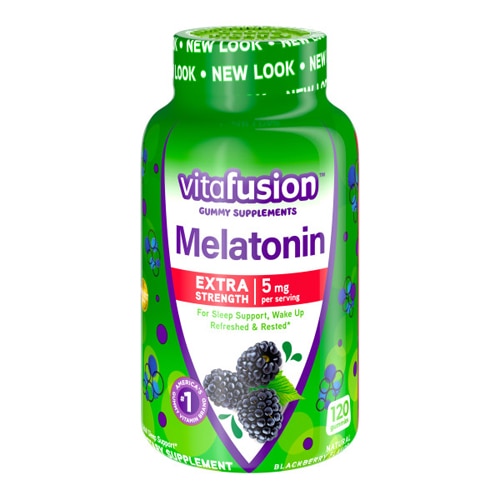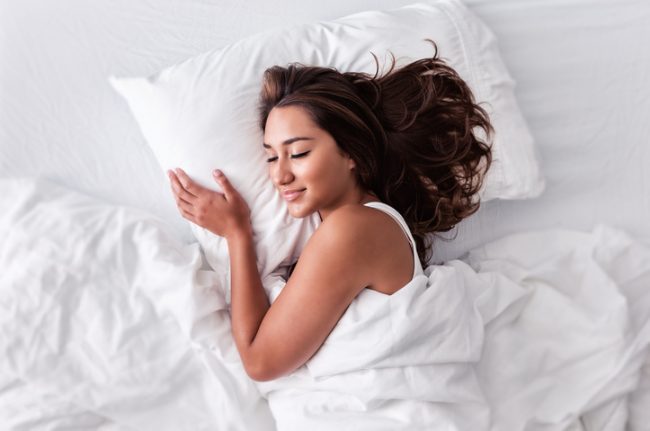Having trouble nodding off at night? Chances are a pal or healthcare professional has raved about the benefits of melatonin. Which, on the surface, may sound terrific—after all, what harm could be done by taking a supplement that mimics one of the body’s most basic hormones? And while melatonin indeed has its pluses—and can be a boon for those who are traveling great distances—it’s vital to debunk the myths that surround it. With that in mind, here are four myths about melatonin—so that you can make an informed decision.
But first: what is melatonin, anyway?
Melatonin is naturally produced in your body—in the pineal gland, to be exact, which is located right above the middle of your brain. During daylight hours, this hormone remains inactive, while other hormones—such as cortisol—keep you awake and engaged. Once darkness falls, the pineal gland releases melatonin, which decreases alertness (and makes your bed all the more inviting), before lowering again to nearly imperceptible levels around 9 am. Consider it the body’s ultimate clock, an internal timer that encourages you to make the most out of daylight.
But as natural as melatonin may be, our ability to produce it dwindles with age. And since melatonin levels are impacted by light, the shorter days of winter—as well as insomnia, working the graveyard shift or going on a transatlantic flight—can disrupt our usual production, leading to oversleeping in some and restlessness in others.
Returning to optimal melatonin levels may be supported by the addition of taking it as a supplement. Melatonin not only provides natural support for sleep, it also encourages rest in the elderly, has a variety of potent antioxidant activities and helps circadian rhythms normalize after jet lag.†
That said, rumors about what it can and cannot do abound, rendering it a mystery to many. Here are four of the most prevalent misconceptions:
1. Melatonin is a sleeping pill
In a culture that glorifies instant gratification, from immediate pain relief to liposuction, taking a melatonin supplement with the belief that it operates like a sleeping pill is tempting—but misguided. Most sleeping pills fall under the class of psychoactive drugs and bear similarities to sedatives.
There are two classes of sleeping pills: benzodiazepines and nonbenzodiazepine. In short, the Mayo Clinic reports, “Sleeping pills that are benzodiazepines belong to a group of medicines called central nervous system depressants, which slow down the nervous system. In comparison, newer, nonbenzodiazepine sleeping pills appear to have a safer side effect profile.”
Melatonin, on the other hand, is neither—rather, it provides sleep support. “Melatonin is a sleep and body clock regulator – NOT a sleep initiator,” Dr. Michael Breus—aka “The Sleep Doctor”—says. “Melatonin works with your biological clock by telling your brain when it is time to sleep. Melatonin does not increase your sleep drive or need for sleep.”
Similarly, your body’s natural melatonin is not solely a “sleep” hormone—it has a number of physiological functions. Bottom line? Melatonin can help you fall asleep, but it does not induce it.†
2. Melatonin has zero side effects
Many are under the assumption that because melatonin is a supplement—rather than, say, a prescription medication—there are no side effects. But anything we put in our body, whether it be a vitamin or a mineral, can have an impact. Common possible side effects of melatonin include drowsiness, dizziness and headaches. Less common but still potential side effects may be irritability, anxiety, nausea, stomach cramps and depression.
“‘There’s also a concern of throwing off your body’s circadian rhythm, i.e. your body’s physical, mental, and behavioral changes that follow a 24-hour cycle, when you take melatonin supplements,’ says sleep medicine doctor and neurologist W. Christopher Winter, M.D., of Charlottesville Neurology and Sleep Medicine,” Self reports.
Additionally, if you take melatonin too often, you may put yourself at risk of developing what’s known as “shift work sleep disorder”—a condition that includes symptoms that range from insomnia to difficulty concentrating.
3. Melatonin is non-habit-forming
When melatonin first broke out on the scene twenty-two years ago (thanks in part to MIT neuroscientist, Dr. Richard Wurtman), the supplement was marketed as non-habit forming. “‘Researchers say pills of the natural hormone...will bring on slumber quickly without the addictive effects of drugs,’ the New York Times reported at the time,” The Huffington Post writes. “In the same article, Judith Vaitukaitis, then director of the National Center for Research Resource, said the hormone ‘offered hope for a natural, non-addictive agent that could improve sleep for millions of Americans.’”
But, according to the doctor behind the craze himself, “melatonin supplements may work at first, but soon you’ll stop responding because you desensitize the brain. And as a consequence, not only won’t you respond to the stuff you take…you won’t respond to the stuff you make, so it can actually promote insomnia after a period of time.”
In response, people increase their dosage in an attempt to find the relief they may have originally experienced—or hope to experience for the first time. In turn, they may develop a dependence on (and increased tolerance for) the dietary supplement.
4. All melatonin supplements are created equal
The quality of melatonin depends on the manufacturer, just like herbs and other supplements do. What’s more, because melatonin is characterized as a dietary supplement, it doesn’t need to go through the rigors of an FDA approval before hitting the market. “As a result, the supplement may say they contain a certain amount of melatonin, while the pills actually have a different amount,” Self reports.
Translation? Do your research and go with a trusted company for your melatonin supplement. Furthermore, talk to your doctor to determine if melatonin is right for you and whether or not it may interact with any other medications or supplements you may be taking.
Better yet, think not about what sort of pill you can take to help you sleep but what you can do for your health, all day long, to promote a good night’s rest. Restricting your caffeine intake, getting adequate exercise, managing your stress levels, following a healthy diet—all can have an enormous impact on your ability to fall and stay asleep, no supplement required.
†These statements have not been approved by the Food and Drug Administration. These products are not intended to diagnose, treat, cure or prevent disease.





